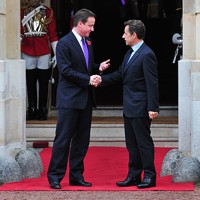NATO’s military intervention in Libya once again showed that the alliance’s internal cohesion can quickly become a center of gravity in any out-of-area operation. Moreover, the strategic position adopted by the United States, now widely known by the unfortunate moniker of “leading from behind,” has put the role played by European member states into sharp relief. Given Germany’s continued reluctance to participate in out-of-area operations, Franco-British relations are now decisive in both regards.
Ahead of the NATO Summit in Chicago in May, and one year after the beginning of the Libyan crisis, the strategic relationship between the U.K. and France continues to raise questions. While there is a strong case for optimism, a number of political and military challenges remain for Franco-British security and defense cooperation.
In November 2010 at Lancaster House in London, French President Nicolas Sarkozy and British Prime Minister David Cameron signed unprecedented treaties to improve bilateral cooperation on defense and security matters. These agreements emerged out of convergent strategic agendas, similar security threats and shared economic incentives. A few months later, the developments in Libya proved to be a key test for Paris and London, but also -- ultimately -- an opportunity to show, both domestically and internationally, the two sides’ political willingness and military capacity to act together when needed. In other words, Libya showed that the Lancaster House treaties carried some weight.

